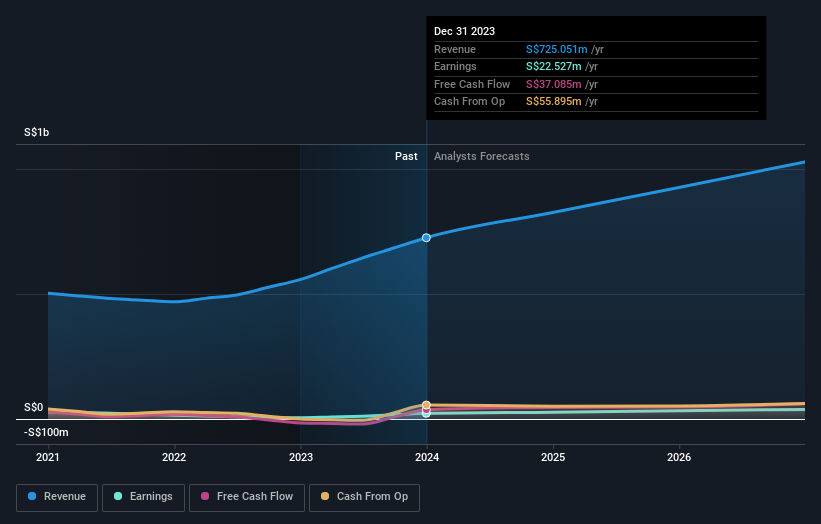While private equity firms own 23% of CSE Global Limited (SGX:544), retail investors are its largest shareholders with 53% ownership
Key Insights
The considerable ownership by retail investors in CSE Global indicates that they collectively have a greater say in management and business strategy
A total of 22 investors have a majority stake in the company with 47% ownership
To get a sense of who is truly in control of CSE Global Limited (SGX:544), it is important to understand the ownership structure of the business. The group holding the most number of shares in the company, around 53% to be precise, is retail investors. Put another way, the group faces the maximum upside potential (or downside risk).
Meanwhile, private equity firms make up 23% of the company’s shareholders.
Let's delve deeper into each type of owner of CSE Global, beginning with the chart below.
Check out our latest analysis for CSE Global
What Does The Institutional Ownership Tell Us About CSE Global?
Institutional investors commonly compare their own returns to the returns of a commonly followed index. So they generally do consider buying larger companies that are included in the relevant benchmark index.
As you can see, institutional investors have a fair amount of stake in CSE Global. This suggests some credibility amongst professional investors. But we can't rely on that fact alone since institutions make bad investments sometimes, just like everyone does. It is not uncommon to see a big share price drop if two large institutional investors try to sell out of a stock at the same time. So it is worth checking the past earnings trajectory of CSE Global, (below). Of course, keep in mind that there are other factors to consider, too.
Hedge funds don't have many shares in CSE Global. Temasek Holdings (Private) Limited is currently the largest shareholder, with 23% of shares outstanding. For context, the second largest shareholder holds about 4.4% of the shares outstanding, followed by an ownership of 4.3% by the third-largest shareholder. Additionally, the company's CEO Boon Kheng Lim directly holds 3.2% of the total shares outstanding.
Our studies suggest that the top 22 shareholders collectively control less than half of the company's shares, meaning that the company's shares are widely disseminated and there is no dominant shareholder.
While studying institutional ownership for a company can add value to your research, it is also a good practice to research analyst recommendations to get a deeper understand of a stock's expected performance. Quite a few analysts cover the stock, so you could look into forecast growth quite easily.
Insider Ownership Of CSE Global
The definition of company insiders can be subjective and does vary between jurisdictions. Our data reflects individual insiders, capturing board members at the very least. Company management run the business, but the CEO will answer to the board, even if he or she is a member of it.
Most consider insider ownership a positive because it can indicate the board is well aligned with other shareholders. However, on some occasions too much power is concentrated within this group.
Our most recent data indicates that insiders own some shares in CSE Global Limited. As individuals, the insiders collectively own S$21m worth of the S$275m company. It is good to see some investment by insiders, but it might be worth checking if those insiders have been buying.
General Public Ownership
The general public, mostly comprising of individual investors, collectively holds 53% of CSE Global shares. With this amount of ownership, retail investors can collectively play a role in decisions that affect shareholder returns, such as dividend policies and the appointment of directors. They can also exercise the power to vote on acquisitions or mergers that may not improve profitability.
Private Equity Ownership
With an ownership of 23%, private equity firms are in a position to play a role in shaping corporate strategy with a focus on value creation. Some might like this, because private equity are sometimes activists who hold management accountable. But other times, private equity is selling out, having taking the company public.
Next Steps:
I find it very interesting to look at who exactly owns a company. But to truly gain insight, we need to consider other information, too. Take risks for example - CSE Global has 2 warning signs we think you should be aware of.
If you would prefer discover what analysts are predicting in terms of future growth, do not miss this free report on analyst forecasts.
NB: Figures in this article are calculated using data from the last twelve months, which refer to the 12-month period ending on the last date of the month the financial statement is dated. This may not be consistent with full year annual report figures.
Have feedback on this article? Concerned about the content? Get in touch with us directly. Alternatively, email editorial-team (at) simplywallst.com.
This article by Simply Wall St is general in nature. We provide commentary based on historical data and analyst forecasts only using an unbiased methodology and our articles are not intended to be financial advice. It does not constitute a recommendation to buy or sell any stock, and does not take account of your objectives, or your financial situation. We aim to bring you long-term focused analysis driven by fundamental data. Note that our analysis may not factor in the latest price-sensitive company announcements or qualitative material. Simply Wall St has no position in any stocks mentioned.

 Yahoo Finance
Yahoo Finance 

